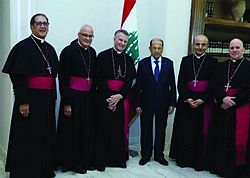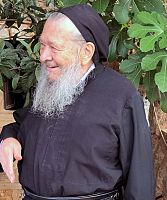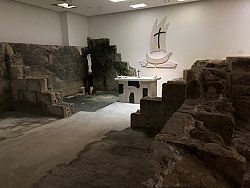Bishop Solis visits Lebanon

SALT LAKE CITY — During his recent visit to Lebanon, Bishop Oscar A. Solis saw the contrast between building bridges and constructing walls to deal with differences of religion.
The country, which is located on the Mediterranean Sea, shares borders with Syria and Israel. In recent years Lebanon has struggled to provide services for 2 million migrants and refugees fleeing conflict and persecution in their homelands.
Religiously, the country is predominantly Catholic and Muslim; the Maronite Catholic rite was founded near Mount Lebanon in the late fourth century. After military conflict from 1975 to 1989, a parliamentary democratic government was established that requires that Lebanon’s president be a Maronite Christian, the Speaker of the Parliament a Shi’a Muslim and the Prime Minister a Sunni Muslim.
Bishop Solis’ visit to Lebanon came about as a result of an invitation issued last year by Cardinal Bechara Boutros al-Rahi, the 77th Patriarch of Antioch and head of the Maronite Catholic Church, who came to Utah last October. Because about half of Lebanese Maronite Catholics live abroad, the cardinal travels on a regular basis to minister to them. In Utah there is one Maronite congregation, who worship at Saint Jude Maronite Church in Murray.
While meeting with Bishop Solis, Cardinal Boutros al-Rahi invited him to Lebanon.
Bishop Solis accepted that invitation and traveled there for a week beginning June 18. He was a member of a contingent that also included Bishop A. Elias Zaidan of the Eparchy of Our Lady of Lebanon of Los Angeles; Archbishop Samuel J. Aquila of Denver; Archbishop Timothy P. Broglio of the Military Services, USA and chairman of the U.S. Conference of Catholic Bishops’ Committee on International Justice & Peace; and Bishop Gregory J. Mansour of the Eparchy of Saint Maron of Brooklyn and chairman of Catholic Relief Services’ Board of Directors.
In Lebanon, the bishops met with different key Lebanese leaders, including President Michel Aoun, Bishop Solis said. The president explained that of the country’s 4 million citizens, 2 million live abroad, while at the same time there are 2 million refugees, many of whom are Muslim, in Lebanon.
President Aoun is worried about the country’s economic ability to provide services to the refugees, because it strains the government’s resources, said Bishop Solis, adding that Aoun takes pride in his country’s position as a center for international religious dialogue and ecumenism. The Lebanese president also appealed to the international community to help find the refugees a permanent home, said Bishop Solis, who visited some refugee camps with the rest of the U.S. delegation and spoke with people housed there.
“If you just listen to the radio or watch the news on TV, you don’t really get the exact picture” of what life is like in that part of the world, Bishop Solis said. He met with “Christians who had to flee their country [because of religious persecution or military conflict]. Listening to the story of what they went through to escape, and their children being traumatized by violence, by fear and uncertainty, it hits you right there in your heart.”
The U.S. bishops also went to a shelter for people who are victims of violent crimes and human trafficking from Ethiopia, Eritrea, Egypt, Iraq and the Philippines. Aid to the shelter is provided by Caritas Internationalis, a group of Catholic relief organizations that works with the poor and oppressed in more than 200 countries worldwide. Catholic Relief Services, the international humanitarian aid organization of the U.S. Conference of Catholic Bishops, is a member of Caritas Internationalis.
“The work of Caritas Internationalis and Catholic Relief Services in reaching out is incredible,” Bishop Solis said. “It makes you feel proud to be Catholic to see how our Catholic Church reaches out to meet the needs of those people who need love, care and compassion, tenderness, to make them feel the dignity of being considered as human beings. … In attending to the needs of these displaced migrants – it’s heart-breaking to see them and hear their stories. To see it with your own eyes, to see their faces, makes a lot of difference. You immediately feel the hurt, the ache, the pain is tremendous. It makes you cry.”
In talking with the refugees, Bishop Solis heard many of them say that with political, economic and religious instability, there is no future for them in their country of origin and nothing to return to, which makes it difficult to repatriate them, he said.
The U.S. bishops also met with the Christian Patriarchs of the region, who face religious persecution in their countries. “They are happy that there are people who express an interest in knowing what’s happening in the Middle East,” Bishop Solis said.
In addition, the U.S. bishops met with some of Lebanon’s Sunni and Shiite leaders, who along with the Christians “are trying to foster religious dialogue and bridge issues with an ecumenical spirit,” Bishop Solis said. “It’s a beautiful thing to learn about the need for global solidarity – the need to be more aware of what is really going on in those areas.”
The bishops’ visit was not focused strictly on political and social matters. They also were able to visit the Monastery of Saint Maron Annaya, which houses the tomb of St. Charbel; and the Kadisha Valley, where Christian monastic communities have existed for centuries.
To visit one of the monks, the bishops hiked for two miles up a steep, rocky goat trail. The monk, who has been living there for 40 years, had a “glow of joy in his face,” Bishop Solis said, adding that the monks “live a life of solitude, a life of prayer, a life of work and study – that’s all they do.”
On the last day of their visit, the bishops went to the Sea of Tyre. It was near there, as Mark 7:24-30 records, that a Syrophoenician woman begged Jesus to cure her daughter.
Being in a place where Jesus walked was inspiring, Bishop Solis said.
Also while in Tyre the bishops were able to see the massive cement wall that Israel is building in the Golan Heights to separate it from Syria.
“I saw with my own eyes how differences can divide people, instead of building bridges,” Bishop Solis said, adding that he also could view the nearby Syrian refugee camps. “What kind of life do they have?” he asked.
By contrast, the bishops also met with some Catholic consecrated religious women who live in a camp among Palestinian Muslims. When asked what they do, the sisters said, “We bring the presence of Jesus Christ to them,” and in this, Bishop Solis said, “you see the hope and innate goodness of humanity.”
© Copyright 2024 The Diocese of Salt Lake City. All rights reserved.



Stay Connected With Us